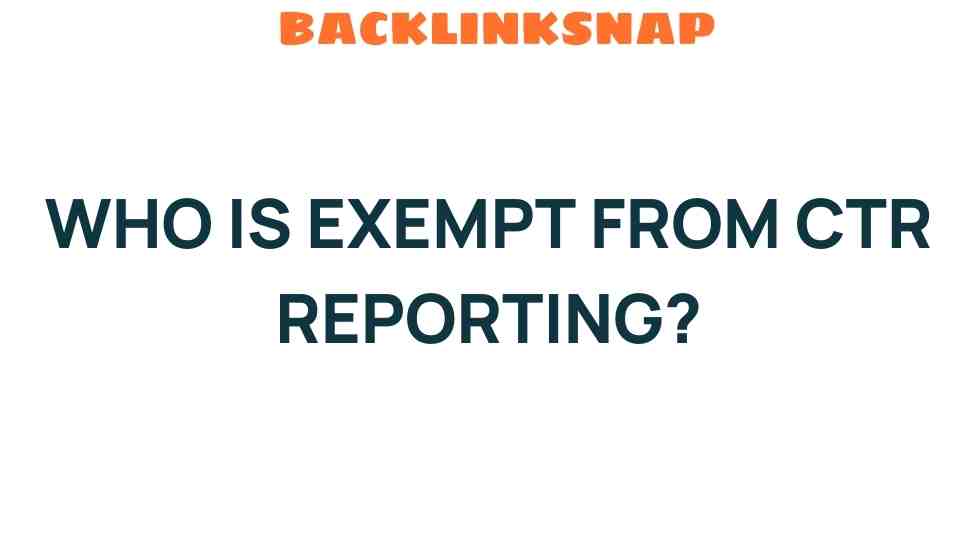Who is Exempt from CTR Reporting? Uncovering the Hidden Exceptions
In the intricate world of financial regulations, compliance is key, especially when it comes to transactions that may raise red flags. One of the essential aspects of compliance is Currency Transaction Report (CTR) reporting, which plays a crucial role in the fight against money laundering and other financial crimes. However, not all transactions are created equal, and certain exemptions exist that can leave both financial institutions and customers scratching their heads. In this article, we’ll delve deep into CTR reporting, the exemptions that exist, and what this means for compliance in banking and financial institutions.
Understanding CTR Reporting
Before we dive into exemptions, it’s vital to grasp what CTR reporting entails. Financial institutions are mandated by the Bank Secrecy Act (BSA) to report any cash transactions exceeding $10,000 in a single day. This regulation is primarily aimed at monitoring potential money laundering activities and ensuring that large sums of cash don’t go unchecked.
CTR reporting requires banks to file these reports with the Financial Crimes Enforcement Network (FinCEN), which then analyzes the data for any suspicious patterns. But, as mentioned, certain transactions are exempt from this requirement, which can lead to confusion among banking professionals and clients alike.
Exemptions from CTR Reporting
Now let’s break down those exemptions. They can be categorized into two main types: exemptions for certain types of customers and exemptions for specific transactions.
Exempt Customers
Some customers may qualify for exemptions based on their business nature or their relationship with the bank. Here are a few categories of exempt customers:
- Government Agencies: Transactions involving federal, state, and local governments are typically exempt. These entities engage in numerous cash transactions, and reporting them could result in an overwhelming amount of paperwork without significant benefit.
- Financial Institutions: Transactions conducted by other financial institutions are also exempt, as these institutions are subject to their own regulatory scrutiny.
- Publicly Traded Companies: Certain publicly traded companies may be exempt from CTR reporting if they meet specific criteria, primarily based on their financial activity and regulatory oversight.
Exempt Transactions
Beyond customer classifications, certain transactions are inherently exempt from CTR reporting. These may include:
- Check Cashing: Cashing checks that do not exceed the $10,000 limit in a single day is not subject to CTR reporting. This exemption can simplify the process for customers who rely on checks for income.
- Wire Transfers: Transfers of funds via wire that do not exceed this threshold also bypass CTR requirements, which helps streamline the operations for banks.
- Transactions Involving the Sale of Securities: When clients are purchasing or selling securities, these transactions are generally exempt, provided they follow specific regulations.
Compliance and the Importance of Understanding Exemptions
Understanding these exemptions is crucial for financial institutions. Compliance is not just about following rules; it’s about fostering trust and integrity within the financial system. Misunderstanding or misapplying CTR reporting requirements can lead to significant consequences, including penalties and reputational damage.
From personal experience working in a compliance department, I can attest that confusion often arises regarding what qualifies as an exempt transaction. Training staff on these exemptions can save time and resources, allowing financial institutions to focus on genuinely suspicious activities rather than getting bogged down by unnecessary reporting.
The Role of Anti-Money Laundering (AML) Programs
Robust anti-money laundering (AML) programs are essential for any financial institution. These programs are designed to identify and report suspicious activities, ensuring compliance with federal regulations. Understanding CTR reporting exemptions is a critical part of an effective AML strategy.
By clearly delineating which transactions require reporting and which do not, financial institutions can allocate their resources more efficiently. This means that instead of flooding FinCEN with reports that offer little value, institutions can focus on transactions that genuinely warrant further investigation. The goal is to strike a balance between regulatory compliance and operational efficiency.
Frequently Asked Questions (FAQs)
1. What is a Currency Transaction Report (CTR)?
A Currency Transaction Report (CTR) is a form that financial institutions must file with FinCEN for cash transactions exceeding $10,000 in a single day, as required by the Bank Secrecy Act.
2. Who needs to file a CTR?
Financial institutions, including banks and credit unions, are required to file CTRs for qualifying cash transactions conducted by their customers.
3. Are there penalties for not filing a CTR?
Yes, failing to file a CTR when required can result in severe penalties, including fines and possible criminal charges for willful neglect.
4. How can a financial institution determine if a customer qualifies for exemption?
Financial institutions can assess exemptions based on customer classification, transaction type, and adherence to specific criteria outlined in BSA regulations.
5. Can individuals request their CTRs from financial institutions?
Yes, individuals can request their CTRs, as they are considered part of the customer’s record. However, access may vary based on the institution’s policies.
6. How does CTR reporting help in anti-money laundering efforts?
CTR reporting helps authorities track large cash transactions, which can be indicative of money laundering or other illicit activities, thus aiding in the prevention and investigation of financial crimes.
Conclusion
In summary, understanding who is exempt from CTR reporting is not just a regulatory obligation but a crucial aspect of effective compliance in the financial sector. By knowing the specific exemptions for customers and transactions, financial institutions can streamline their operations while maintaining vigilance against money laundering and other financial crimes. As regulations continue to evolve, staying informed about these exemptions will empower financial institutions to navigate the complexities of compliance more effectively. For further insights, check out the FinCEN guidelines that continually shape the landscape of financial regulations.
As the financial world becomes increasingly interconnected, maintaining compliance while understanding the nuances of reporting requirements will ensure that both institutions and customers can operate with confidence and integrity.
This article is in the category Digital Marketing and created by BacklinkSnap Team




